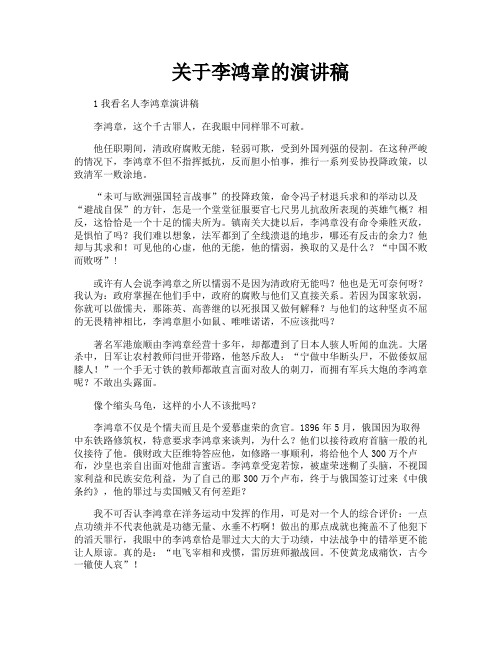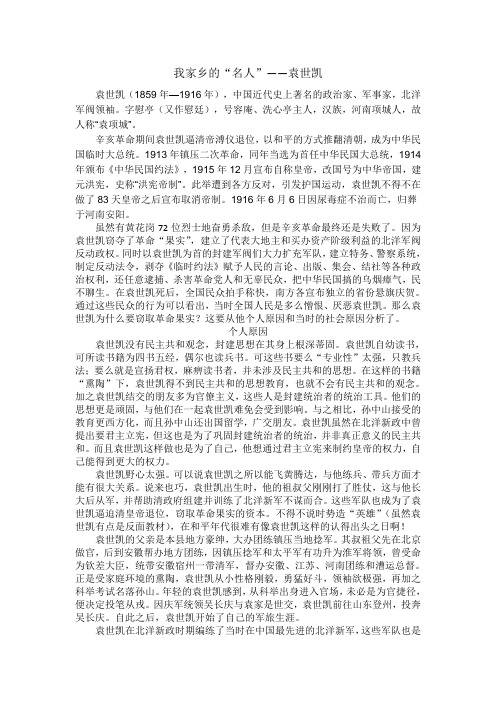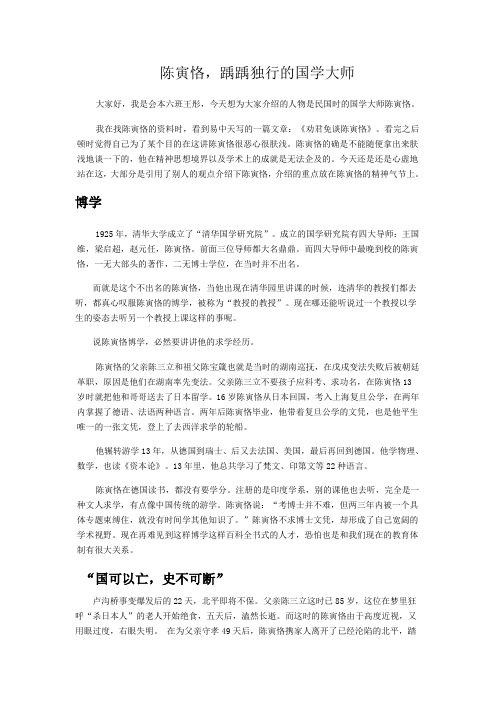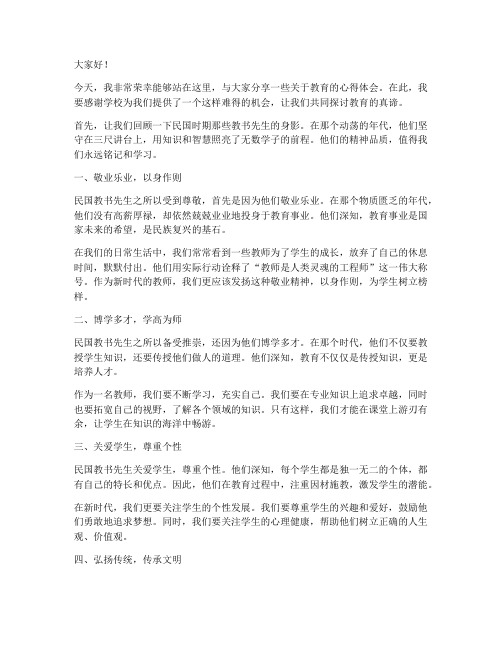走进民国名人演讲稿
关于李鸿章的演讲稿

关于李鸿章的演讲稿1我看名人李鸿章演讲稿李鸿章,这个千古罪人,在我眼中同样罪不可赦。
他任职期间,清政府腐败无能,轻弱可欺,受到外国列强的侵割。
在这种严峻的情况下,李鸿章不但不指挥抵抗,反而胆小怕事,推行一系列妥协投降政策,以致清军一败涂地。
“未可与欧洲强国轻言战事”的投降政策,命令冯子材退兵求和的举动以及“避战自保”的方针,怎是一个堂堂征服要官七尺男儿抗敌所表现的英雄气概?相反,这恰恰是一个十足的懦夫所为。
镇南关大捷以后,李鸿章没有命令乘胜灭敌,是惧怕了吗?我们难以想象,法军都到了全线溃退的地步,哪还有反击的余力?他却与其求和!可见他的心虚,他的无能,他的懦弱,换取的又是什么?“中国不败而败呀”!或许有人会说李鸿章之所以懦弱不是因为清政府无能吗?他也是无可奈何呀?我认为:政府掌握在他们手中,政府的腐败与他们又直接关系。
若因为国家软弱,你就可以做懦夫,那陈英、高善继的以死报国又做何解释?与他们的这种坚贞不屈的无畏精神相比,李鸿章胆小如鼠、唯唯诺诺,不应该批吗?著名军港旅顺由李鸿章经营十多年,却都遭到了日本人骇人听闻的血洗。
大屠杀中,日军让农村教师闫世开带路,他怒斥敌人:“宁做中华断头尸,不做倭奴屈膝人!”一个手无寸铁的教师都敢直言面对敌人的刺刀,而拥有军兵大炮的李鸿章呢?不敢出头露面。
像个缩头乌龟,这样的小人不该批吗?李鸿章不仅是个懦夫而且是个爱慕虚荣的贪官。
1896年5月,俄国因为取得中东铁路修筑权,特意要求李鸿章来谈判,为什么?他们以接待政府首脑一般的礼仪接待了他。
俄财政大臣维特答应他,如修路一事顺利,将给他个人300万个卢布,沙皇也亲自出面对他甜言蜜语。
李鸿章受宠若惊,被虚荣迷糊了头脑,不视国家利益和民族安危利益,为了自己的那300万个卢布,终于与俄国签订过来《中俄条约》,他的罪过与卖国贼又有何差距?我不可否认李鸿章在洋务运动中发挥的作用,可是对一个人的综合评价:一点点功绩并不代表他就是功德无量、永垂不朽啊!做出的那点成就也掩盖不了他犯下的滔天罪行,我眼中的李鸿章恰是罪过大大的大于功绩,中法战争中的错举更不能让人原谅。
近代史介绍名人演讲稿范文

大家好!今天,我站在这里,怀着无比崇敬的心情,为大家介绍一位近代史上杰出的名人——孙中山先生。
孙中山先生是我国伟大的民主革命先行者,他的一生为国家的独立、民族的解放、人民的幸福付出了巨大的努力,他的思想和精神永远值得我们学习和传承。
一、孙中山先生的生平孙中山先生,原名孙文,字载之,号日新,又号逸仙。
他于1866年11月12日出生于广东省香山县一个农民家庭。
孙中山先生自幼聪颖过人,勤奋好学,尤其对国家的命运和民族的未来充满了关切。
在留学日本期间,他开始接触西方民主思想,深受启发。
回国后,他积极投身于革命事业,提出了“三民主义”的思想体系,为我国的民主革命奠定了基础。
二、孙中山先生的思想1.三民主义孙中山先生提出了“民族、民权、民生”的“三民主义”思想,这是他革命理论的核心。
民族主义强调民族独立和民族尊严,主张推翻清王朝的统治,实现国家的独立;民权主义强调人民享有平等的政治权利,主张建立民主共和国;民生主义强调改善人民的生活状况,主张实现社会的公平正义。
2.平均地权孙中山先生认为,土地是民生之源,平均地权是实现民生主义的关键。
他主张实行土地国有,平均分配土地给农民,以解决土地问题,提高农民的生活水平。
3.联俄、联共、扶助农工孙中山先生提出了“联俄、联共、扶助农工”的三大政策,这是他为实现国家统一、民族复兴而采取的策略。
联俄政策旨在争取国际支持,联共政策旨在与中国共产党合作,扶助农工政策旨在解决农民和工人的问题。
三、孙中山先生的贡献1.推翻清王朝孙中山先生领导的辛亥革命,成功推翻了清王朝的统治,结束了我国两千多年的封建君主专制制度,为民主共和制度的建立奠定了基础。
2.建立中华民国辛亥革命后,孙中山先生被推举为中华民国临时大总统,他领导成立了中华民国政府,颁布了《中华民国临时约法》,为我国的民主政治发展奠定了基础。
3.促进国家统一孙中山先生为实现国家统一,积极推动南北议和,结束了长达十年的内战。
他还提出了“五权宪法”的思想,为我国的政治体制改革提供了理论依据。
有关顾炎武担当的演讲稿

有关顾炎武担当的演讲稿顾炎武,字懋庵,号燕农,江苏无锡人,生于清同治三年,卒于民国二年。
他早年留学日本,深受启蒙思想的影响,成为了中国近代思想解放的先驱。
他提出了“中学为体,西学为用”的教育主张,主张学习西方科学技术,强调实用主义教育。
他还主张变法维新,提出了“师夷之长技以制夷”的主张,主张学习西方先进技术,以自强自立。
他的思想对中国近代的变革产生了深远的影响。
顾炎武一生都在为中国的民族复兴和社会进步而不懈努力。
他不仅是一位杰出的思想家和教育家,还是一位坚定的爱国者和社会改革者。
他的一生都在为中国的现代化事业而奋斗,他的一生都在为中国的进步事业而努力。
他的一生都在为中国的未来而奋斗。
顾炎武的担当精神,给我们留下了深刻的启示。
作为当代青年,我们应该继承和发扬顾炎武的担当精神,努力学习,不断进步,为实现中华民族的伟大复兴而努力奋斗。
我们应该立足现实,着眼未来,为实现中国梦而努力奋斗。
我们应该不断学习,不断进步,为实现中国的现代化而努力奋斗。
我们应该不断创新,不断进取,为实现中国的强盛而努力奋斗。
我们应该不忘初心,牢记使命,为实现中华民族的伟大复兴而努力奋斗。
顾炎武的担当精神,给我们树立了榜样,激励我们勇往直前。
让我们继承和发扬顾炎武的担当精神,努力学习,不断进步,为实现中华民族的伟大复兴而努力奋斗。
愿我们共同努力,共同奋斗,为实现中华民族的伟大复兴而努力奋斗。
愿我们共同努力,共同奋斗,为实现中国的现代化而努力奋斗。
愿我们共同努力,共同奋斗,为实现中国的强盛而努力奋斗。
愿我们共同努力,共同奋斗,为实现中国梦而努力奋斗。
顾炎武的担当精神,给我们指明了方向,激励我们前行。
让我们继承和发扬顾炎武的担当精神,努力学习,不断进步,为实现中华民族的伟大复兴而努力奋斗。
让我们共同努力,共同奋斗,为实现中华民族的伟大复兴而努力奋斗。
愿我们共同为实现中国的强盛而努力奋斗。
愿我们共同努力,共同奋斗,为实现中国梦而努力奋斗。
演讲稿

我家乡的“名人”——袁世凯袁世凯(1859年—1916年),中国近代史上著名的政治家、军事家,北洋军阀领袖。
字慰亭(又作慰廷),号容庵、洗心亭主人,汉族,河南项城人,故人称“袁项城”。
辛亥革命期间袁世凯逼清帝溥仪退位,以和平的方式推翻清朝,成为中华民国临时大总统。
1913年镇压二次革命,同年当选为首任中华民国大总统,1914年颁布《中华民国约法》,1915年12月宣布自称皇帝,改国号为中华帝国,建元洪宪,史称“洪宪帝制”。
此举遭到各方反对,引发护国运动,袁世凯不得不在做了83天皇帝之后宣布取消帝制。
1916年6月6日因尿毒症不治而亡,归葬于河南安阳。
虽然有黄花岗72位烈士地奋勇杀敌,但是辛亥革命最终还是失败了。
因为袁世凯窃夺了革命“果实”,建立了代表大地主和买办资产阶级利益的北洋军阀反动政权。
同时以袁世凯为首的封建军阀们大力扩充军队,建立特务、警察系统,制定反动法令,剥夺《临时约法》赋予人民的言论、出版、集会、结社等各种政治权利,还任意逮捕、杀害革命党人和无辜民众,把中华民国搞的乌烟瘴气,民不聊生。
在袁世凯死后,全国民众拍手称快,南方各宣布独立的省份悬旗庆贺。
通过这些民众的行为可以看出,当时全国人民是多么憎恨、厌恶袁世凯。
那么袁世凯为什么要窃取革命果实?这要从他个人原因和当时的社会原因分析了。
个人原因袁世凯没有民主共和观念,封建思想在其身上根深蒂固。
袁世凯自幼读书,可所读书籍为四书五经,偶尔也读兵书。
可这些书要么“专业性”太强,只教兵法;要么就是宣扬君权,麻痹读书者,并未涉及民主共和的思想。
在这样的书籍“熏陶”下,袁世凯得不到民主共和的思想教育,也就不会有民主共和的观念。
加之袁世凯结交的朋友多为官僚主义,这些人是封建统治者的统治工具。
他们的思想更是顽固,与他们在一起袁世凯难免会受到影响。
与之相比,孙中山接受的教育更西方化,而且孙中山还出国留学,广交朋友。
袁世凯虽然在北洋新政中曾提出要君主立宪,但这也是为了巩固封建统治者的统治,并非真正意义的民主共和。
陈寅恪演讲用稿

陈寅恪,踽踽独行的国学大师大家好,我是会本六班王彤,今天想为大家介绍的人物是民国时的国学大师陈寅恪。
我在找陈寅恪的资料时,看到易中天写的一篇文章:《劝君免谈陈寅恪》。
看完之后顿时觉得自己为了某个目的在这讲陈寅恪很恶心很肤浅。
陈寅恪的确是不能随便拿出来肤浅地谈一下的,他在精神思想境界以及学术上的成就是无法企及的。
今天还是还是心虚地站在这,大部分是引用了别人的观点介绍下陈寅恪,介绍的重点放在陈寅恪的精神气节上。
博学1925年,清华大学成立了“清华国学研究院”。
成立的国学研究院有四大导师:王国维,梁启超,赵元任,陈寅恪。
前面三位导师都大名鼎鼎。
而四大导师中最晚到校的陈寅恪,一无大部头的著作,二无博士学位,在当时并不出名。
而就是这个不出名的陈寅恪,当他出现在清华园里讲课的时候,连清华的教授们都去听,都真心叹服陈寅恪的博学,被称为“教授的教授”。
现在哪还能听说过一个教授以学生的姿态去听另一个教授上课这样的事呢。
说陈寅恪博学,必然要讲讲他的求学经历。
陈寅恪的父亲陈三立和祖父陈宝箴也就是当时的湖南巡抚,在戊戌变法失败后被朝廷革职,原因是他们在湖南率先变法。
父亲陈三立不要孩子应科考、求功名,在陈寅恪13岁时就把他和哥哥送去了日本留学。
16岁陈寅恪从日本回国,考入上海复旦公学,在两年内掌握了德语、法语两种语言。
两年后陈寅恪毕业,他带着复旦公学的文凭,也是他平生唯一的一张文凭,登上了去西洋求学的轮船。
他辗转游学13年,从德国到瑞士、后又去法国、美国,最后再回到德国。
他学物理、数学,也读《资本论》。
13年里,他总共学习了梵文、印第文等22种语言。
陈寅恪在德国读书,都没有要学分。
注册的是印度学系,别的课他也去听,完全是一种文人求学,有点像中国传统的游学。
陈寅恪说:“考博士并不难,但两三年内被一个具体专题束缚住,就没有时间学其他知识了。
”陈寅恪不求博士文凭,却形成了自己宽阔的学术视野。
现在再难见到这样博学这样百科全书式的人才,恐怕也是和我们现在的教育体制有很大关系。
故事演讲稿三分钟

张学良的故事今天,我要讲的是民国时期的一位高富帅——张学良的故事。
张学良,能文能武,少年得志,年纪轻轻就已经是一位团长了。
一天,他正坐在椅子上悠闲地看着兵书,他的警卫小跑进来说:“报告团长!前方发现一名奸细。
”张学良放下书,心想此时正值战事紧张之际,敌方奸细必须予以重视。
便说:“带他进来,我亲自审问!”张学良瞥了一眼,只见一个其貌不扬、身材矮小,穿着粗布破衣的人被警卫绑着进来,跪倒在地。
按照例行审问程序,他问了一句:“你叫什么名字?”“张学良”奸细回答说。
啪!张学良拍案而起,大声说:“我问你叫什么名字!”这个奸细就想横竖一死,便大声回答说“张学良!”这时,张学良望着自己的警卫,警卫立刻会意说:“报告团长,这个人名字叫,张学良”说完怯怯地看着他。
张学良皱起眉头,继续审问。
最终确定此人是来打探军情的奸细,处以极刑。
而按照当时的规定,处以死刑的人必须由团长本人在他的名字上用红色笔打叉。
张学良看着纸上那熟悉的三个字,几次举起红笔,在落笔的那一刻却又放下了。
实在是下不去狠心啊!但张学良是谁啊,文韬武略,才思敏捷。
忽然,灵机一动,他便在“良”字的左边加了一个反犬旁,变成了“狼”。
终于心满意足的划下了一个大大的叉,扬长而去。
从此以后,那个风流倜傥的高富帅叫“张学良”,那个相貌平平的矮矬穷叫“张学狼”。
篇二:课前三分钟励志演讲稿课前三分钟励志演讲稿一尊敬的老师,亲爱的同学们,大家早上好!按照惯例,这次轮到我来做“课前三分钟励志演讲”,下面我要演讲的题目是乐观的生活态度。
曾看过这样一段话:小鸟说:我从天空中飞过,但天空中没有留下我的痕迹。
泰戈尔说,天空中没有留下我的痕迹,但我已飞过。
同样的状况,却有两种不同的态度,相信后者的态度更能赢得大家的认可。
其实生活是一面镜子,你对他笑,他就会向你露出笑脸,你对它哭,那么你最终只会收获沮丧的心情。
或许有人会抱怨说,上天是如此的不公平,努力奋斗多年的我到现在为止还是一个经理助手。
三分钟近代史人物演讲稿

大家好!今天,我非常荣幸能站在这里,为大家讲述一位在中国近代史上具有重要地位的人物——孙中山先生。
孙中山先生,原名孙文,字载之,号日新,广东省香山县(今中山市)人。
他生于1866年11月12日,逝世于1925年3月12日。
孙中山先生是我国伟大的民族英雄、伟大的爱国主义者、中国民主革命的伟大先行者。
他一生致力于推翻清朝封建统治,实现民族独立、人民解放和国家富强,为中华民族的伟大复兴作出了卓越贡献。
一、投身革命,矢志不渝孙中山先生从小就具有强烈的爱国情怀。
1882年,他考入香港西医书院,学习医学。
在求学期间,他接触到了西方先进的思想文化,认识到中国封建社会的腐败和落后,立志要改变国家的命运。
1894年,孙中山先生在檀香山创立了中国第一个资产阶级革命团体——兴中会。
从此,他开始了长达数十年的革命生涯。
他提出了“驱除鞑虏,恢复中华,创立民国,平均地权”的革命纲领,号召广大民众起来反抗清朝的统治。
1905年,孙中山先生在日本东京成立了中国同盟会,这是中国第一个全国性的资产阶级革命政党。
他明确提出“三民主义”,即民族主义、民权主义和民生主义,为中国的民主革命指明了方向。
二、辛亥革命,推翻帝制1911年,孙中山先生领导了辛亥革命,推翻了清朝封建统治,结束了中国两千多年的封建帝制。
这场革命是中国历史上的一次伟大转折,标志着中国民主革命的胜利。
辛亥革命后,孙中山先生被推举为中华民国临时大总统。
他颁布了《中华民国临时约法》,确立了民主共和的政治制度。
然而,由于各种原因,孙中山先生未能实现自己的政治理想。
三、二次革命,捍卫民主1913年,袁世凯篡夺了辛亥革命的胜利果实,建立了北洋军阀政府。
孙中山先生领导了二次革命,试图推翻袁世凯的统治,捍卫民主共和制度。
然而,二次革命最终以失败告终。
面对挫折,孙中山先生并未放弃。
他继续坚持革命事业,致力于推动中国社会的进步。
四、新三民主义,实现民族复兴1924年,孙中山先生在广州建立了黄埔军校,培养了一大批革命军事人才。
袁世凯 演讲稿

老师同学下午好!今天我将给大家讲述袁世凯。
袁世凯1859年—1916年),字慰庭,号容庵,是中国近代史上赫赫有名的北洋军鼻祖、中华民国大总统,风云一时,叱咤中国政坛。
袁世凯生于官宦世家,幼时聪明伶俐,记忆非凡,理想远大,14岁曾作诗眼前龙虎斗不了,杀气直上千云萧,我欲向天张巨口,一口吞尽胡天骄。
”老时也作“楼小能容膝,檐高老树齐,开轩平北斗,翻觉太行低”,可谓气吞山河。
袁世凯年轻时科场失意,22岁投笔从戎,效力淮军将领吴长庆门下,因办事严谨,严于律己,秉公执法,不苟私情,很快得到上级赏识。
1882年,大清藩属朝鲜发生壬午军乱,求助于清庭,袁世凯即随军入朝平乱。
驻朝期间,袁世凯头脑灵活,办事机敏、干练,表现出较高的外交、军事才能,颇为清庭朝野瞩目。
在朝期间,有官兵惹事生非,奸淫掳掠,无恶不做,袁世凯既向上汇报,并以辞职相威胁,要求严厉处罚,吴长庆为保大清名誉,批准他执行,他连夜行动,处罚起来心冷如铁,基本就是一个字“杀”,长官吴长庆的面子一点不顾,吴长庆也没办法,只得经常告戒手下不要犯法,避免落入袁世凯手中。
袁世凯练兵也非常拿手,他的军队最有战斗力,他还帮助朝鲜练兵,并亲自制订章程,采用德式操法,英美装备,他训练的朝鲜军队也相当骁勇。
朝鲜国王极为赏识,曾想挽留并许以朝鲜陆军大统领之位。
1884年,日本挑起朝鲜内乱,袁世凯在没得到授权的情况下,当机立断,把日本赶出朝鲜。
1894年,中国甲午战败,退出朝鲜,袁世凯看国力衰弱,军队素质低下,建议训练新兵。
1895年受命以道员衔赴天津督练“新式陆军”。
他仿造欧洲军制训练军队,取得极大的收获。
同时在此基础上扶植自己的势力,形成了日后北洋军阀的班底。
在抗击八国联军中屡立战功,虽然无法取胜,但建制从没被打散,比别的军队要强悍的多。
后来以此为基础,在河北保定编炼北洋常备军,就是后来大家熟悉的北洋军,实力居全国之首,为他以后强取总统宝座打下基础。
袁世凯善于收买人心,手下非常卖命,在军饷方面从不拖欠,同时期他的官兵待遇要高于其他军队。
孙中山的故事英雄事迹演讲稿

孙中山的故事英雄事迹演讲稿
大家好,今天我想和大家分享的主题是孙中山的故事和英雄事迹。
孙中山,一个伟大的民族英雄,是中国近代史上具有重要地位的政治家和革命家。
他为中国的民族独立和民主革命事业做出了卓越的贡献,被誉为“国父”。
孙中山于1866年出生在广东省中山市一个贫困的农民家庭。
在他年轻的时候,中国社会正处于极度动荡和落后的状态,受封建统治和外国列强的侵略压迫。
孙中山从小就对中国的现状感到不满,他立志要推翻满清王朝的统治,实现中
国的民族独立和民主。
他在海外留学期间与马克思主义接触,深受启发,认为彻底的社会改革是推动中国前进的关键。
1894年,孙中山创立了光复会,致力于推翻清朝统治。
在多次失败的起义后,他于1911年领导了辛亥革命,成功推翻了清朝的统治,建立了中华民国。
作为中华民国的临时大总统,孙中山推行了一系列政治改革,提倡三民主义,
力图实现“民族独立、民主政治、人民生活”的宏伟目标。
他提倡了联俄、联共、扶
助农工的政策,推动了中国的革命事业迈向新的阶段。
尽管孙中山生前未能看到中国实现真正的繁荣富强,但他开创的革命事业为后
人树立了光辉的楷模,成为了中国近现代史上不可磨灭的一笔。
在我们今天的社会中,孙中山的精神和事迹依然具有极其重要的意义。
我们应
该以他为榜样,坚定不移地为实现民族复兴和国家富强而努力奋斗。
让我们共同努力,继承和发扬孙中山先生的革命事业,为实现中华民族的伟大复兴而努力奋斗!
谢谢大家!。
民国史爱好者演讲稿范文

今天,我很荣幸站在这里,与大家一同探讨我们热爱的民国史。
民国时期,是我国历史上一个充满变革、充满激情、充满悲剧的时期。
在这个时期,我国经历了许多重大事件,涌现出许多杰出人物。
今天,我就从以下几个方面,与大家分享我对民国史的一些理解和感悟。
一、民国时期的背景民国时期,是指1912年至1949年这段历史。
这一时期,我国经历了辛亥革命、北洋政府、国民政府、抗日战争、解放战争等一系列重大事件。
民国时期的背景,主要有以下几个方面:1. 清朝的衰落:19世纪末,清朝统治下的中国,政治腐败、经济凋敝、民生疾苦,国家面临着严重的危机。
2. 辛亥革命:1911年,辛亥革命爆发,推翻了清朝统治,结束了我国两千多年的封建君主制。
3. 各派政治力量的角逐:民国时期,各派政治力量纷纷崛起,如北洋政府、国民政府、共产党等,他们为了争夺国家权力,展开了激烈的角逐。
4. 国际环境:民国时期,我国面临着列强的侵略和干涉,国家主权受到严重威胁。
二、民国时期的重大事件1. 辛亥革命:辛亥革命是我国历史上的一次伟大革命,它推翻了清朝统治,结束了我国两千多年的封建君主制,为我国民主共和制度的建立奠定了基础。
2. 北洋政府时期:北洋政府时期,我国政治动荡,军阀割据,民不聊生。
这一时期,袁世凯、段祺瑞等北洋军阀先后掌握政权,国家陷入混乱。
3. 国民政府时期:国民政府时期,我国实现了形式上的统一。
这一时期,蒋介石、宋子文、汪精卫等国民党领导人,试图通过改革,实现国家现代化。
4. 抗日战争:抗日战争是我国历史上一次伟大的民族解放战争。
在这场战争中,我国人民英勇抵抗日本侵略者,最终取得了胜利。
5. 解放战争:解放战争是我国历史上一次伟大的革命战争。
在这场战争中,中国共产党领导的人民军队,打败了国民党军队,实现了国家统一。
三、民国时期的杰出人物1. 孙中山:孙中山是我国伟大的民主革命先行者,他提出了“三民主义”,领导了辛亥革命,为我国民主共和制度的建立做出了巨大贡献。
近代史人物事迹演讲稿范文

大家好!今天,我站在这里,非常荣幸能够向大家讲述一位近代史上的伟大人物——孙中山先生的事迹。
孙中山先生是中国近代伟大的民主革命先行者,他的一生充满了传奇色彩,他的事迹也值得我们永远铭记。
一、早年奋斗,立志救国孙中山先生原名孙文,字载之,广东香山人。
他出生于一个贫苦的家庭,从小就饱受封建社会的压迫和剥削。
孙中山先生从小就立志要拯救国家,改变人民的命运。
他曾说:“吾志所向,一往无前,愈挫愈奋,再接再厉。
”孙中山先生早年曾在香港西医书院学习,毕业后回到家乡行医。
然而,他并没有满足于个人的发展,而是时刻关注着国家的命运。
他目睹了清政府的腐败无能,民不聊生,深感救国救民的责任重大。
于是,他开始投身革命事业,寻求救国之道。
二、推翻帝制,创建民国孙中山先生在革命的道路上,经历了无数的挫折和磨难。
他先后组织成立了兴中会、中国同盟会等革命团体,提出了“驱除鞑虏,恢复中华,创立民国,平均地权”的革命纲领。
在孙中山先生的带领下,革命党人发动了多次起义,如广州起义、黄花岗起义等,虽然都以失败告终,但革命党人的英勇事迹传遍全国,极大地鼓舞了人民的斗志。
1911年,辛亥革命爆发,孙中山先生被推举为临时大总统。
他宣布推翻了两千多年的封建帝制,建立了中华民国。
这一伟大的历史事件,标志着中国进入了民主共和的新时代。
孙中山先生为推翻帝制、创建民国立下了不朽的功勋。
三、推动改革,实现民族振兴孙中山先生在位期间,积极推动改革,努力实现民族振兴。
他提出了“三民主义”的思想,即民族主义、民权主义、民生主义。
他认为,只有实现民族独立、民主政治和人民幸福,才能真正实现国家的振兴。
在孙中山先生的领导下,中华民国进行了大量的改革。
他倡导“五权宪法”,试图建立民主政治制度;他推动教育改革,提倡普及教育,提高国民素质;他还努力发展经济,推动国家现代化进程。
然而,由于种种原因,孙中山先生的改革并未能取得预期的成果。
1925年,孙中山先生因病逝世。
但他留下的思想和精神,却一直激励着后人不断奋斗。
民国时期女子演讲稿范文

大家好!今天,我站在这里,怀着无比激动的心情,想和大家一起回顾那段激情燃烧的岁月,共同探讨民国时期女子在历史长河中的重要作用。
在此,我将以《民国女子:风雨同舟,砥砺前行》为题,发表我的演讲。
一、引言民国时期,我国社会发生了翻天覆地的变化。
在这个充满变革的时代,女子们勇敢地走出家门,投身于国家和社会的各项事业,展现了新时代女性的风采。
她们在政治、经济、文化、教育等领域取得了令人瞩目的成就,为我国近代史留下了浓墨重彩的一笔。
二、民国女子在政治领域的崛起1. 女子参政运动民国时期,女子参政运动风起云涌。
一些有识之士开始关注女权问题,呼吁女子享有与男子平等的政治权利。
1922年,中华民国成立女子参政同盟会,标志着女子参政运动进入了一个新的阶段。
2. 女子政治家在民国时期,涌现出了一批杰出的女子政治家。
如宋庆龄、何香凝、丁玲等,她们积极参与国家政治,为国家繁荣富强贡献了自己的力量。
三、民国女子在经济领域的崛起1. 女子创业潮民国时期,随着社会经济的不断发展,女子创业潮兴起。
许多女子投身于工商业,成为我国民族工业的奠基人。
如女企业家吴贻芳、陆小曼等,她们在商业领域取得了举世瞩目的成就。
2. 女子手工业者民国时期,女子手工业者众多。
她们凭借一双巧手,制作出精美的手工艺品,为我国民间艺术的发展做出了贡献。
四、民国女子在文化领域的崛起1. 女子文学创作民国时期,女子文学创作呈现出繁荣景象。
一批杰出的女作家如冰心、丁玲、萧红等,她们以独特的视角和真挚的情感,描绘了民国女性的生活状态,为我国现代文学史留下了宝贵的财富。
2. 女子艺术教育民国时期,女子艺术教育得到了重视。
许多女子投身于艺术教育事业,培养了一大批优秀的艺术人才。
如女教育家张抗抗、赵元任等,她们为我国艺术事业的发展做出了巨大贡献。
五、民国女子在教育领域的崛起1. 女子教育普及民国时期,女子教育得到了空前的发展。
许多女子学校应运而生,为女子提供了接受教育的机会。
近代风云人物演讲稿范文

大家好!今天,我站在这里,非常荣幸能够与大家共同回顾近代以来我国的风云人物,分享他们的故事和智慧。
近代以来,我国经历了无数的变革与挑战,涌现出了一批批英勇无畏、智慧卓越的风云人物。
他们以坚定的信念、卓越的才能和无私的奉献,为我国的繁荣富强做出了巨大贡献。
下面,就让我带领大家走进这些风云人物的传奇故事。
一、英勇无畏的革命先驱近代以来,我国民族危亡,民不聊生。
在这样的背景下,涌现出一批英勇无畏的革命先驱,他们以坚定的信念和顽强的毅力,为民族独立和人民解放事业英勇奋斗。
1.孙中山:伟大的民族英雄孙中山先生是我国近代伟大的民族英雄,他提出了“三民主义”思想,领导了辛亥革命,推翻了两千多年的封建帝制,为我国民主革命奠定了基础。
孙中山先生一生致力于民族复兴和国家富强,他的爱国精神、革命精神和崇高的人格魅力,永远值得我们怀念和学习。
2.陈独秀:新文化运动的旗手陈独秀先生是我国新文化运动的旗手,他倡导“民主、科学”思想,主张破除封建迷信,推动社会进步。
陈独秀先生以敏锐的洞察力和坚定的信念,为我国新文化运动的发展做出了巨大贡献。
二、卓越的科学家和思想家在近代以来,我国涌现出一批卓越的科学家和思想家,他们为我国的科技发展和思想进步做出了重要贡献。
1.鲁迅:民族脊梁鲁迅先生是我国伟大的文学家、思想家和革命家,他以锐利的笔触,揭示了旧社会的黑暗,呼唤民族觉醒。
鲁迅先生的作品具有强烈的现实主义精神,为我国文学事业的发展树立了光辉的典范。
2.爱因斯坦:相对论的奠基人爱因斯坦先生是20世纪最伟大的科学家之一,他的相对论理论彻底改变了人类对宇宙的认识。
爱因斯坦先生以卓越的智慧和创新精神,为世界科技发展做出了巨大贡献。
三、杰出的政治家和军事家在近代以来,我国涌现出一批杰出的政治家和军事家,他们为我国的政治稳定和国家安全做出了重要贡献。
1.毛泽东:伟大的领袖毛泽东先生是我国伟大的领袖,他领导了我国人民进行了艰苦卓绝的革命斗争,实现了民族独立和人民解放。
民国教书先生演讲稿范文

大家好!今天,我非常荣幸能够站在这里,与大家分享一些关于教育的心得体会。
在此,我要感谢学校为我们提供了一个这样难得的机会,让我们共同探讨教育的真谛。
首先,让我们回顾一下民国时期那些教书先生的身影。
在那个动荡的年代,他们坚守在三尺讲台上,用知识和智慧照亮了无数学子的前程。
他们的精神品质,值得我们永远铭记和学习。
一、敬业乐业,以身作则民国教书先生之所以受到尊敬,首先是因为他们敬业乐业。
在那个物质匮乏的年代,他们没有高薪厚禄,却依然兢兢业业地投身于教育事业。
他们深知,教育事业是国家未来的希望,是民族复兴的基石。
在我们的日常生活中,我们常常看到一些教师为了学生的成长,放弃了自己的休息时间,默默付出。
他们用实际行动诠释了“教师是人类灵魂的工程师”这一伟大称号。
作为新时代的教师,我们更应该发扬这种敬业精神,以身作则,为学生树立榜样。
二、博学多才,学高为师民国教书先生之所以备受推崇,还因为他们博学多才。
在那个时代,他们不仅要教授学生知识,还要传授他们做人的道理。
他们深知,教育不仅仅是传授知识,更是培养人才。
作为一名教师,我们要不断学习,充实自己。
我们要在专业知识上追求卓越,同时也要拓宽自己的视野,了解各个领域的知识。
只有这样,我们才能在课堂上游刃有余,让学生在知识的海洋中畅游。
三、关爱学生,尊重个性民国教书先生关爱学生,尊重个性。
他们深知,每个学生都是独一无二的个体,都有自己的特长和优点。
因此,他们在教育过程中,注重因材施教,激发学生的潜能。
在新时代,我们更要关注学生的个性发展。
我们要尊重学生的兴趣和爱好,鼓励他们勇敢地追求梦想。
同时,我们要关注学生的心理健康,帮助他们树立正确的人生观、价值观。
四、弘扬传统,传承文明民国教书先生弘扬传统,传承文明。
他们深知,中华民族有着五千年的悠久历史,拥有丰富的文化遗产。
因此,他们在教育过程中,注重传承和弘扬中华民族优秀传统文化。
作为新时代的教师,我们要肩负起传承文明的历史使命。
关于《民国有佳人 遗世而独立]》演讲稿
![关于《民国有佳人 遗世而独立]》演讲稿](https://img.taocdn.com/s3/m/60ce4177d0d233d4b04e695c.png)
民国有佳人遗世而独立]一个人,一本书,一片天空,一帘幽梦,于无声处独自散发出幽幽芬芳,此时无声胜有声。
翻开书页,《盐店街》三个充满古色古香的大字映入眼帘,在这本书中,每一位读者都见证了一位女子不朽的传奇,而这位女子用她的曲折和充满传奇的坚韧,见证了民国川南盐业的辉煌与落寞。
小说中的主人公七七孟至衡曾在她嫁至林家时天真地认为只要夫妻彼此交付真心,无论多大的家族仇恨与现实困难,都会为这份爱让开通道,但一次次饱受离别痛苦与争夫的心酸后,孟至衡终于明白,受过伤的爱,永远回不到最初。
而所谓的幸福,在流年光景里,不过是一场绚烂花事,开到茶蘼终须尽。
在这场没有硝烟的盐业大战和爱情大战里,七七用纯真无畏的爱,筑起一道柔软的高墙,为他的丈夫林静渊抵挡父亲的明枪暗箭;但是林静渊却用他敏感多疑的心,制成一把锋利尖锐的矛,刺向七七毫无防备的心口。
这也正印证了那句古话:“世上男人,纵是情深似海,在现实与利益面前,大抵都会选择自己的父母和事业,世上的女人,一旦深陷情潭,都甘愿为了这份爱承受一切苦难。
”最初的悸动,最后的决裂。
十年的痴情终成错付。
七七用了七年的时间挣扎,最后逃离家庭,这七年,她孤独吗?诚然,这世界上没有不孤独的人,“山盟虽在,锦书难拖”的陆游,“帘卷西风,人比黄花瘦”的李清照…更别提像七七这样的凡夫俗子,我们的孤独只是沧海一粟”;终会化作轻烟。
而有的人,既能孤在“独坐幽篁里”,又能美在“明月来相照”;既能孤在做得了“孤舟蓑笠翁”,又能美在“独坐寒江雪”;既能看一座山看到“众鸟高飞尽”,又能“相看俩不厌”,自生美意。
比起用孤独来形容七七的七年,我更想用“孤美”来描述她。
她用七年的时间从一个天真烂漫的少女变成一位内心极其坚韧的女子,有一份寂的秉性,一份幽的底色,更有一份豁然的天性。
即使后来林母百般陷害她,她都能淡然化解,一人成景,孤美好画,怎能不叫人心生傲然。
一滴墨孤独了,会成为往事白衬衫上的污渍,却也可以孤美地染开一条雨巷,或一句诗行;一封信孤独了。
- 1、下载文档前请自行甄别文档内容的完整性,平台不提供额外的编辑、内容补充、找答案等附加服务。
- 2、"仅部分预览"的文档,不可在线预览部分如存在完整性等问题,可反馈申请退款(可完整预览的文档不适用该条件!)。
- 3、如文档侵犯您的权益,请联系客服反馈,我们会尽快为您处理(人工客服工作时间:9:00-18:30)。
走进民国名人演讲稿篇一:名人经典演讲稿名人经典演讲稿名人经典演讲稿我们不能单独行动。
当我们行动时,我们必须保证勇往直前。
我们不能后退。
有人问热心民权运动的人:“你们什么时候会感到满意?”只要黑人依然是不堪形容的警-察暴行恐怖的牺牲品,我们就决不会满意。
只要我们在旅途劳顿后,却被公路旁汽车游客旅社和城市旅馆拒之门外,我们就决不会满意。
只要黑人的基本活动范围只限于从狭小的黑人居住区到较大的黑人居住区,我们就决不会满意。
只要我们的孩子被“仅供白人”的牌子剥夺个性,损毁尊严,我们就决不会满意。
只要密西西比州的黑人不能参加选举,纽约州的黑人认为他们与选举毫不相干,我们就决不会满意。
不,不,我们不会满意,直至公正似水奔流,正义如泉喷涌。
I am not unmindful that some of you have come here out of great trials and tribulations. Some of you have come fresh from narrow cells. Some of you have come from areas where your quest for freedom left you battered by the storms of persecution and staggered by the winds of police brutality. You have been the veterans of creative suffering. Continue to work with the faith that unearned suffering is redemptive.我并非没有注意到你们有些人历尽艰难困苦来到这里。
你们有些人刚刚走出狭小的牢房。
有些人来自因追求自由而遭受迫-害风暴袭击和警-察暴虐狂飙摧残的地区。
你们饱经风霜,历尽苦难。
继续努力吧,要相信:无辜受苦终得拯救。
Go back to Mississippi, go back to Alabama, go back to Georgia, go back toLouisiana, go back to the slums and ghettos of our northern cities, knowing that somehow this situation can and will be changed. Let us not wallow in the valley of despair.篇二:名人演讲稿Richard M. NixonThe Great Silent Majoritydelivered 3 November 1969演讲者简介:理查德·米尔豪斯·尼克松,第36任美国副总统与第37任美国总统。
尼克松是美国史上唯一当过两届总统与两届副总统的人,但也是唯一于在位期间,以辞职的方式离开总统职位的美国总统。
演讲背景介绍:1969年,美国深陷越南战争的泥潭,为了应付国内国外的压力弄的焦头烂额。
在越南,美军损兵折将,而在国内,反战运动风起云涌。
越战这个烫手的山芋于是如同现在的伊拉克一般,成了食之无味而弃之可惜的鸡肋。
当时的美国总统尼克松为了应对危局,在国内寻求广泛的人民的首肯,提出了“沉默的大多数”这个说法。
尼克松说,那些站出来游行示威、强烈反对越战、甚至攻击警察机关的人们,虽然显得声势浩大,但实际上却并非是多数,而绝大多数美国人的声音却被这些激进的呼喊所掩盖;绝大多数美国人都是爱国的,不希望国家走入颓势,只是种种原因,他们并未站出来表达自己的意见,而是处于沉默状态。
虽然,也有批评人士认为这是尼克松为自己的越战政策涂脂抹粉。
但他们也不得不承认,尼克松的这番话还真取得了不俗的效果,听过其演说的人,对他的支持率将近八成,而随后1972年的大选,尼克松以压倒性的胜利获得连任,也不能不提这“沉默的大多数”的功劳。
Good evening, my fellow Americans.晚上好!亲爱的同胞们:Tonight I want to talk to you on a subject of deep concern to all Americans and to many people in all parts of theworld, the war in Vietnam.今晚,我想与各位探讨一个问题,这是所有美国人和全球无数人所深切关注的一个问题——越南战争。
I believe that one of the reasons for the deep division about Vietnam is that many Americans have lost confidence in what their Government has told them about our policy. The American people cannot and should not be asked to support a policy which involves the overriding issues of war and peace unless they know the truth about that policy.我认为,在关于越南战争一事上,大家的观点出现了严重分歧的一个重要原因在于:很多美国民众对我们的政府所宣扬的政策已失去了信心。
当前情况下,除非美国人民真正认清政策本质,否则不能也不应该被要求去支持涉及战争与和平等重大问题的政策。
Tonight, therefore, I would like to answer some of the questions that I knoware on the minds of many of you listening to me.所以,今晚,我想借此机会回答一些问题,一些萦绕在你们许多人脑海中的问题。
How and why did America get involved in Vietnam in the first place?How has this administration changed the policy of the previous Administration?What has really happened in the negotiations in Paris and on the battlefront in Vietnam?What choices do we have if we are to end the war?What are the prospects for peace?Now let me begin by describing the situation I found when I was inaugurated on January 20: The war had been going on for four years. Thirty-one thousand Americans had been killed in action. The trainingprogram for the South Vietnamesewas beyond [behind] schedule. Five hundred and forty-thousand Americans were in Vietnam with no plans to reduce the number. No progress had been made at the negotiations in Paris and the United States had not put forth a comprehensive peace proposal.The war was causing deep division at home and criticism from many of our friends, as well as our enemies, abroad.In view of these circumstances, there were some who urged that I end the war at once by ordering the immediate withdrawal of all American forces. From a political standpoint, this would have been a popular and easy course to follow. After all, we became involved in the war while my predecessor was in office. I could blame the defeat, which would be the result of my action, on him -- and come out as thepeacemaker. Some put it to me quitebluntly: This was the only way to avoid allowing Johnson’s war to become Nixon’s war.But I had a greater obligation than to think only of the years of my Administration, and of the next election. I had to think of the effect of my decision on the next generation, and on the future of peace and freedom in America, and in the world.Let us all understand that the question before us is not whether some Americans are for peace and some Americans are against peace. The question at issue is not whether Johnson’s war becomes Nixon’s war. The great question is: How can we win America’s peace?Well, let us turn now to the fundamental issue: Why and how did the United States become involved in Vietnam in the first place? Fifteen years ago North Vietnam, with the logistical support ofCommunist China and the Soviet Union, launched a campaign to impose aCommunist government on South Vietnam by instigating andsupporting a revolution.In response to the request of the Government of South Vietnam, President Eisenhower sent economic aid and military equipment to assist the people of South Vietnam in their efforts to prevent aCommunist takeover. Seven years ago, President Kennedy sent 16,000 military personnel to Vietnam as combat advisers. Four years ago, President Johnson sent American combat forces to South many believe that President Johnson’s decision to sendAmerican combat forces to South Vietnam was wrong. And many others, I among them, have been strongly critical of the way the war has been conducted.But the question facing us today is:Now that we are in the war, what is the best way to end it?In January I could only conclude that the precipitate withdrawal of all American forces from Vietnam would be a disaster not only for South Vietnam but for the United States and for the cause of the South Vietnamese, our precipitate withdrawal would inevitably allow the Communists to repeat the massacres which followed their takeover in the North 15 years before. They thenmurdered more than 50,000 people and hundreds of thousands more died in slave labor camps.We saw a prelude of what would happen in South Vietnam when the Communists entered the city of Hue last year. During their brief rule there, there was a bloody reign of terror in which 3,000 civilians were clubbed, shot to death, and buried in mass graves.With the sudden collapse of our support, these atrocities at Hue would become the nightmare of the entire nation and particularly for the million-and-a half Catholic refugees who fled to South Vietnam when the Communists took over in the North.For the United States this first defeat in our nation’s history would result in a collapse of confidence in American leadership not only in Asia but throughout the world.Three American Presidents have recognized the great stakes involved in Vietnam and understood what had to be done.In 1963 President Kennedy with his characteristic eloquence and clarity said, ”We want to see a stable Government t here,” carrying on the [a] struggle to maintain its national independence.” We believe strongly in that. We are not goingto withdraw from that effort. In my opinion, for us to withdraw from that effort would mean a collapse not only of South Vietnam but Southeast Asia. So we’re going to stay there.”President Eisenhower and President Johnson expressed the same conclusion during their terms of office.For the future of peace, precipitate withdrawal would be a disaster of immense magnitude. A nation cannot remain great if it betrays its allies and lets down its friends. Our defeat and humiliation in South Vietnam without question would promote recklessness in the councils of those great powers who have not yet abandoned their goals ofworlds conquest. This would spark violence wherever our commitments help maintain the peace -- in the Middle East, in Berlin, eventually even in the Western Hemisphere. Ultimately, this would costmore lives. It would not bring peace. It would bring more war.For these reasons I rejected the recommendation that I should end the war by immediately withdrawing all of our forces. I chose instead to change American policy on both the negotiating front and the battle front in order to end the war fought on many fronts. I initiated a pursuit for peace on many fronts. In a television speech on May 14, in a speech篇三:名人经典演讲稿名人经典演讲稿名人经典演讲稿我们不能单独行动。
